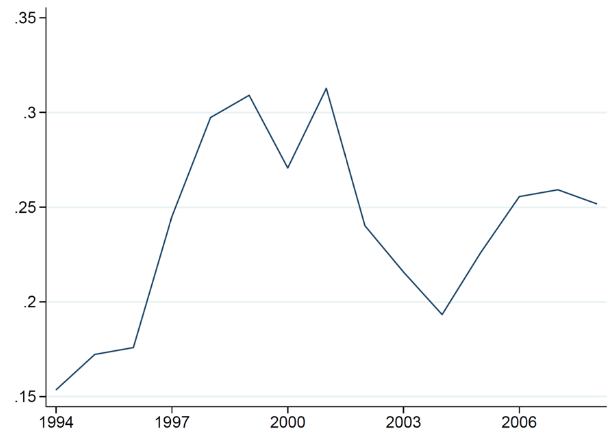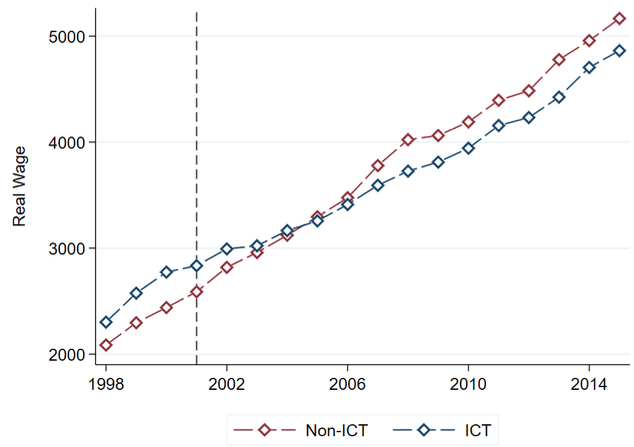Inspired by exciting developments in new technologies and the high salaries offered in tech firms, many graduates are attracted by jobs in the tech sector. But what are the long-term prospects of starting one's career in the booming – one might say ‘bubbly’ – tech sector?
One view is that individuals starting in a booming tech sector are exposed to new technologies, allowing them to acquire valuable skills and making them more productive in the long term. Even if the tech bubble bursts, so the argument goes, workers can redeploy these skills in other firms and sectors. In this view, the current attraction exerted by the tech sector on young talents can be viewed with optimism.
The opposite view is that workers starting in a booming tech sector are at risk of acquiring human capital early in their career that will rapidly depreciate. As technological change accelerates during tech booms, workers who joined the tech bubble will be left behind (e.g. Chari and Hopenhayn 1991). In this view, the current choice of many young talents to join the tech sector may actually be a risky bet.
Which view is correct? Technology still does not allow us to see into the future, but past experience might be informative. In a recent paper (Hombert and Matray 2019), we study the previous large tech bubble experienced by developed economies: the dot-com bubble that took place in the information and communication technology (ICT) sector in the late 1990s. We use linked employer-employee administrative data from France to study the long-term earnings of French high-skilled workers who started their career during the late 1990s ICT boom.
The ICT boom cohort discount
As shown in Figure 1, during the boom, 30% of all high-skilled labour market entrants started their career in the ICT sector. This represents almost a two-fold increase from the pre-boom period. When the boom ends around 2002, the share of high-skill workers starting in ICT goes back close to its pre-boom level.
Figure 1 Share of high-skill workers starting their career in the ICT sector
To study the impact of starting one's career in the booming sector tech, we zoom in on the ‘boom cohort’, defined as high-skilled workers taking their first job between 1998 and 2001. We compare the wage dynamics of those workers who started in the ICT sector to that of similar workers who starting in a different sector. As shown in Figure 2, and consistent with the boom creating a shortage of talents, high-skilled workers starting in the booming ICT sector earn on average 5% higher entry wages than workers starting in other sectors. As times goes by, however, the wage difference between the two groups shrinks and the two curves cross in 2005. Stunningly, the difference keeps widening such that by 2015, high-skilled workers who started in the booming ICT sector end up earning almost 7% less than workers who started outside ICT. Overall, a career start in ICT is associated with 11 percentage points lower wage growth in the subsequent 15 years. We call this phenomenon the ICT boom cohort discount.
Figure 2 Wage of high-skill workers starting their career in the ICT sector (blue) versus workers starting outside the ICT sector (red) (monthly gross wage in constant 2017 euros)
A discount that masks winners and losers?
One might suspect that the ICT boom cohort discount only holds for workers starting in low-quality tech firms. One might also wonder whether French tech firms are not low-quality firms altogether. Since our employee data can be linked with firms' tax filings, we can test these hypotheses. We find ICT boom cohort discounts of similar magnitude for workers starting in high-growth tech firms and for those in low-growth firms. We also find a similar discount for workers starting in the French offices of US tech companies and for those starting in French tech firms. The ICT boom cohort discount is therefore not a low-quality firm or a French firm phenomenon. In fact, we show an even more striking result: the ICT boom cohort discount is not explained by the fact that job losses increase in the ICT sector after the bust. Even workers who never lose their job experience the ICT boom cohort discount.
One might also think that the tech bubble created losers and winners among workers joining the bubble, such that the average ICT boom cohort discount actually masks a small probability of very positive outcomes. This is not the case. The entire distribution of earnings growth distribution of workers starting in the booming ICT sector is shifted to the left. The wage growth discount at the 90th percentile is similar to that at the 10th or 50th percentile.
Is it selection?
One might believe that the ICT boom cohort discount arises because workers attracted to the booming tech sector were of low intrinsic productivity, maybe because individuals pulled by fads are on average worse workers. Their low productivity would have been masked during the boom and became apparent when the boom ended. At this moment, wages started to reflect workers' productivity more accurately. We test this hypothesis by studying the cohort of high-skilled workers who started their career just before the boom, between 1994 and 1996. The idea is that these workers' career choices were not influenced by the bubble, which had not started yet, but those who started in ICT were subsequently exposed to the boom. In econometrics parlance, pre-boom cohort workers who started in ICT were treated but not selected by the boom. Our results show that the wage dynamics of these workers is very similar to those of boom cohort workers. They benefit from a positive wage premium during the boom, followed by a long-term reversal, ending up in 2015 with wages 7% below that of entrants in other sectors. This result is inconsistent with negative selection during the boom.
Is the ICT sector declining across the board?
The ICT boom cohort discount seems to contradict the notion that labour demand in ICT has been rising since the mid-2000s. This paradox is explained by the fact that the wage discount we uncover only applies to the boom cohort. When we replicate our analysis on the post-boom cohort of workers who started their career between 2003 and 2005, we find a completely different pattern. High-skilled workers starting in ICT after the boom face slightly lower entry wages than entrants in other sectors, but they catch up over time such that by 2015 there is no significant difference between the two groups.
Skill obsolescence
Explaining the ICT boom cohort discount is challenging. Our leading hypothesis is that human capital accumulated by high-skilled workers in the booming tech sector depreciates faster than usual because of accelerating technological change. As skills acquired during the boom become obsolete, workers who started in the booming tech sector experience poor long-term wage growth, explaining the ICT boom cohort discount. A fact that is consistent with skill obsolescence is that, when we distinguish between high-skilled individuals holding a STEM occupation and those holding a management/business occupation, we find that only the STEM workers experience the ICT boom cohort discount, whereas business people are immunised against it. This is evidence that the long-term wage discount has to do with technical skills, consistent with the obsolescence explanation.
Conclusion: Beware of tech bubbles?
Bubbles in low-tech sectors such as housing have been shown to reduce educational attainment as individuals drop out of school to work in the bubbly sector (Charles et al. 2018), reducing long-term productivity. The hopes are that high-tech bubbles are different, if starting one's career in a booming tech sector fosters human capital accumulation. Unfortunately, evidence from the last tech boom is not consistent with such a bright view. Human capital accumulated during the tech boom turned out to have low long-term value. This is not to say that the tech boom did not increase aggregate productivity, but the talented individuals who contributed to the boom are not the ones who benefited from it.
References
Chari V V and H Hopenhayn (1991), “Vintage Human Capital, Growth, and the Diffusion of New Technology”, Journal of Political Economy 99(6): 1142–1165.
Charles, K K, E Hurst and M J Notowidigdo (2018), “Housing booms and busts, labor market opportunities, and college attendance”, American Economic Review 108(10):2947-94.
Hombert, J and A Matray (2019), “Technology Boom, Labor Reallocation, and Human Capital Depreciation”, working paper.






